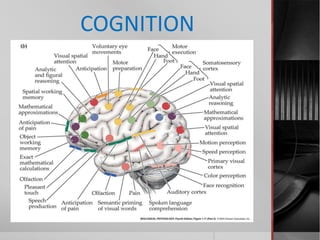
Thinking and Memory
- 1. COGNITION
- 2. Information Processing Information processing enables memory. We rely on memory all the time, and not just for the details of our daily lives. I need to remember who I am and what I stand for. Three steps of Information Processing: 1. Encoding 2. Storage 3. Retrieval
- 4. ENCODING Encoding is the process in which you move information—the raw material, the “stuff” that you will remember—into your memory system. Good students are invariably good encoders of information.
- 5. ENCODING-Automatic Processing and Effortful Processing Thanks to automatic processing, this student may be able to remember where in his textbook he found the information he needs to study with no effort. But he will have to pay attention and use effortful processing to encode the information he’s trying to learn from the book.
- 6. Automatic Processing and Effortful Processing HERMANN EBBINGHAUS (1850–1909) German philosopher who conducted pioneering memory studies. TWO TYPES OF ENCODING: effortful processing: Encoding that requires attention and conscious effort. automatic processing: The unconscious and effortless process of encoding information such as space, time, and frequency.
- 7. ENCODING Serial Position Effect Spacing of Rehearsal Encoding Meaning Encoding Imagery Mnemonic Devices Organizing Information
- 8. STORAGE Storage is the retention of information. Humans have three distinct storage systems: sensory memory short-term/working memory long-term memory
- 9. STORAGE Sensory Memory Brief, initial coding of sensory information in the memory system. Consider how many objects are in view right now. - visual input. iconic store : visual information in sensory memory remains less than half a second. What can you hear right now? echoic store : auditory/sound, information in sensory memory stored for perhaps 3 or 4 seconds. Think of the word echo to remember that echoic is acoustic. Have you ever been spacing off in class and had a teacher ask, with an irritated tone, “What did I just say?” Did you notice that you can generally retrieve that information, even though you truly weren’t paying attention? Thank your echoic store for this ability.
- 10. STORAGE Short-Term/Working Memory: The part of your memory system that contains information you are consciously aware of before it is stored more permanently or forgotten. As compare to Sensory memory, Short-term memory is far more limited because our consciousness itself is limited—we can attend to only a few things at one time. How many things can we attend to according to George Miller? The capacity of short-term/working memory is a limited number of chunks. What is an example of chunks from your everyday learning? How long can we retain information in this portion of our memory? What are the results of Peterson & Peterson experiment?
- 11. As this graph shows, when people are not allowed to rehearse, short-term memory decays rapidly. Within a few seconds, most people are unable to recall three consonants. By the time 20 seconds have passed, nearly everybody has lost their memory of the three consonants. Data from Peterson & Peterson
- 12. STORAGE Long-Term Memory: The relatively permanent and limitless storehouse of the memory system. It can hold memories without conscious effort. Name of your 2nd Grade Teacher, your zip code (when was the last retrieval of these pieces of information?) Individual differences in the capabilities of long-term memory. What type of memory loss patient H.M suffered ?
- 13. Retrieval Recall is the type of retrieval we usually think of as “memory”—searching for information that was previously stored. Recognition is a type of retrieval in which you must identify items you previously learned. Memories weave a web of neural pathways inside the brain. Have you ever noticed that the more you know about a subject, the easier it is to learn even more about it?
- 14. A Hare-Raising Experience If you show people a picture, you can activate certain associations in their memory pathways—a process known as priming. When you later ask them to spell a word that can be spelled in two ways (hare or hair), their response may reflect the content of the picture. Thus, a picture of a rabbit is likely to activate the spelling h-a-r-e. A picture of a barber at work is likely to activate the spelling h-a-i-r.
- 15. Context Context is the environment in which you encode or retrieve information. context effect: The enhanced ability to retrieve information when you are in an environment similar to the one in which you encoded the information. Godden & Baddeley Experiment- Learning Above and underwater.
- 16. Results of Recall Context
- 17. State Dependency state-dependent memory: The enhanced ability to retrieve information when you are in the same physical and emotional state you were in when you encoded the information. The retrieval of memories also depends on your mood. If you’re happy when you encode, you’ll retrieve better when you’re happy. But if you’ve been somewhat depressed as you worked your way through a particular unit in a class, you’ll probably test better when depressed.
- 18. Review for Exam What are the factors that allow us to effectively encode information into our memory system? Describe sensory, short-term/working, and long-term memories? What factors influence what we can remember and what we forget?
- 19. FORGETTING Forgetting as Encoding Failure
- 20. FORGETTING Forgetting as Storage Failure - Ebbinghaus Forgetting Curve Permastore Memory
- 21. FORGETTING Forgetting as Retrieval Failure Interference proactive interference: When an older memory disrupts the recall of a newer memory. retroactive interference: When a more recent memory disrupts the recall of an older memory. Motivated Forgetting
- 22. MEMORY CONSTRUCTION How does memory construction contribute to inaccurate memories? Memory is less like a DVD or a computer hard drive than like a jigsaw puzzle with missing pieces. Your brain “manufactures” new pieces to fill the holes and construct a complete memory. misinformation effect: Incorporating misleading information into a memory of an event.